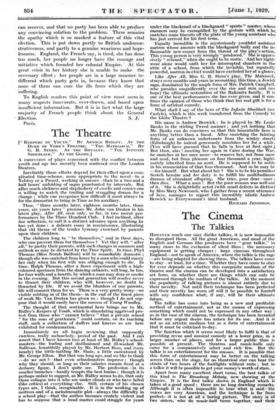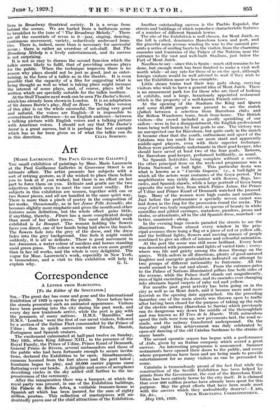• The Cinema
The Talkies
HOWEVER much one may dislike talkies, it is now impossible to disregard them. All the great American, and most of the English and German film producers have "gone talkie," in many cases to the exclusion of silent films ; the necessary equipment is getting cheaper ; large cinemas throughout England—not to speak of America, where the talkie is the rage —are being adapted for showing them. The talkies have come to stay—at least, for a time. Whether they have come to stay for ever depends On whether this composite medium of the theatre and the cinema can be developed into a satisfactory art form, on whether there are things which can only be expressed through the medium of the talkie. At the moment the popularity of talking pictures is almost entirely due to their novelty. Not until their, technique has been perfected and their novelty has worn off will it be possible to foretell with any confidence what; if any, will be their ultimate future.
• The talkie has come into being as a new and profitable method of entertainment, not as the means of expressing something which could not be expressed in any other way; as in the case of the cinema, the technique has been invented before any urgent desire has arisen for its use. Audit is not as an artistic medium but as a form of entertainment that it must be criticized to-day.
The function which it seems most likely to fulfil is that of providing revue and musical comedy at'- a lower price, in a larger number of places, and for a larger public than is possible at present. The theatres and music-halls only cater for a comparatively select and rich= few. But the talkie is an entertainment for the masses: It là possible that this form of entertainment may be better on the talking screen than on the stage, for no theatrical star can bear the strain of two hours of the footlights without rests ; but in a talkie it will be possible to get your money?s worth of stars.
Apart from many excellent short turns; the best talkie of this kind is The Broadway Melody, now showing at the Empire. It is the first talkie shown in England which is taken at a good speed; there are no long drawling remarks. Although it is Often impossible to hear what is said--L-the voices are very American, and the technique is far from perfect—it is not at all a boring picture. The story is of two Sisters,- who do music-hall turns together, and their lives in Broadway theatrical society. It is a .revue from behind the scenes. We are hurled from a bathroom scene- to breakfast to the tune of The Broadway -Melody." - There - are all the essentials of revue in it—jazz, singing, dancing, continuous movement, variety, seductively undressed beau- ties. There is, indeed, more than is necessary for successful revue;. there is rather an overdose of sob-stuff. But The Broadvay Melody is a lively entertainment, and its success is not surprising.
It is not so easy to diseuss the second function which the talkie seems likely to fulfil, that of providing serious plays for the public. When the technique improves there is no reason why plays should not be just as good, just as enter- taining, in the form of a talkie as in the theatre. It is even possible that the capacity of a film for suggesting what is being thought as well as what is taking place might increase the interest of some plays, and, of course, plays will be written which are specially suitable for the talkie medium.
At the Stoll Theatre next week can be seen The Doctor's Secret, which has already been shown in London. It is an adaptation of Sir James Barrie's play, Half an Hour. The talkie version of this play is on the whole successful, the acting very good and natural, the voices are English—it is impossible to overestimate the difference—to an English audience—between a talking picture with English voices and a talking picture with American voices. I should not say that The Doctor's Secret is a great success, but it is perhaps the best example which has so far been given us of what the talkie can do











































 Previous page
Previous page